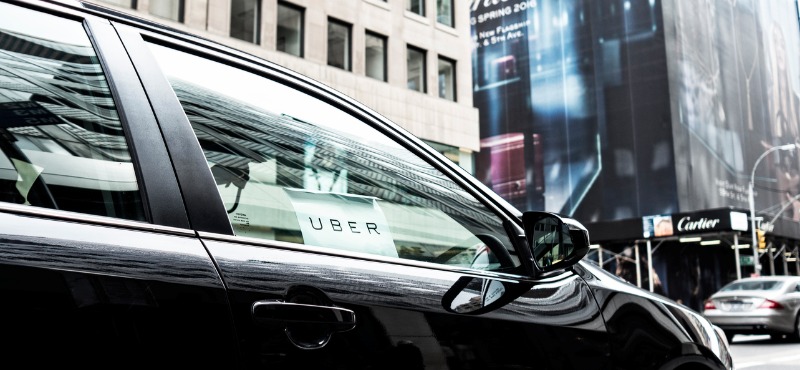Clinton Price has been a driver for the popular ride-sharing service Uber since 2014. Despite complying with all of Uber’s terms and conditions—including background checks, vehicle registration, ride pricing, and route selection—and despite his hard work over his three years of service, Clinton has only earned an average of $4.52 per hour, received no benefits and had no access to unemployment insurance or worker’s compensation during his time with Uber. To those of us who are unfamiliar with driving for a ride-sharing service that low hourly wage may come as a shock. After all, federal law requires employers to pay their employees a minimum of $7.25 per hour and provide them access to things like worker’s compensation in the event they are hurt on the job.
So how is it possible for Uber, one of the most popular companies in the country, to pay Clinton so little and deny him access to basic labor protections? Like all Uber drivers, Clinton is classified by the ride-sharing service as an independent contractor rather than an employee. Clinton believes this categorization is incorrect and is now suing Uber because he believes he’s an employee.
What’s the difference between being an independent contractor and an employee?
The law establishing labor protections like the minimum wage and overtime pay is the Fair Labor Standards Act (commonly called the “FLSA”). Its protections only apply to employees, not independent contractors. It was originally passed way back in 1938. When it was first enacted, the minimum wage was a whopping 25 cents per hour. Adjusted for inflation, that would come out to just over $4.00 per hour today. The law’s provisions relating to work hours, the minimum wage, overtime pay, and other protections have been amended and updated frequently since 1938. The most recent major change came in 2009 when the minimum wage was increased from $5.15 per hour to the current $7.25. Congress’s intent when passing the law was to provide broad protections for American workers by ensuring that they would be treated with basic minimum standards of fairness wherever they worked. The only exception was for independent contractors.
An independent contractor is someone who is in business for himself or herself, as opposed to an employee who is economically dependent on his or her employer. Determining how to classify workers isn’t always straightforward.
How do you determine if someone is an independent contractor or an employee?
To determine whether any individual—including Clinton Price—is an employee entitled to protections under the FLSA, courts consider six factors:
- whether the work is an integral part of the employer’s business;
- whether the worker’s managerial skill affects the worker’s opportunity for profit or loss;
- how the worker’s relative investment compares to the employer’s investment;
- whether the work performed requires special skill and initiative;
- whether the relationship between the worker and employer is permanent or indefinite; and
- the nature and degree of the employer’s control over the worker.
The courts have routinely held that there is no mechanical formula to apply to these factors. Rather they are each considered and weighed against each other. If after considering these factors the weight of the evidence suggests that the economic reality is that the worker is an employee, then the worker is entitled to FLSA protections.
So where does that leave Uber/Lyft drivers?
Let’s consider each of these as they apply to ride-sharing drivers. We won’t know for sure until the courts weigh in, but it appears to us that Uber and Lyft drivers are employees, not independent contractors.
First, whether the work is an integral part of the employer’s business. If the work performed by a worker is an integral component of the employer’s business, it is more likely that the worker will be considered an employee. In the case of Uber and Lyft drivers, the work performed is the only component of the employer’s business. Without drivers, Uber and Lyft would cease to exist.
Second, whether the worker’s managerial skill affects the worker’s opportunity for profit or loss. Put simply, this factor considers whether the worker is in a position to not only profit—for example, receive wages—but also take losses as a result of their performance. A typical employee may be compensated based on performance (as in the case of commissioned salesmen), but they are rarely in a position to take financial losses.
On the other hand, a person in business for him or herself may produce marketing materials, solicit clients and negotiate prices, all of which exposes them to the risk of taking a loss if the business underperforms and those costs aren’t covered. Drivers for Uber and Lyft typically only take ride-sharing assignments as provided by the two companies, they don’t advertise for themselves and they don’t set their own rates. On the other hand, they do often expend money to improve their ride experience—many drivers will keep gum and mints stocked, their car detailed and washed and may also provide things like beverages for their fares.
Third, how the worker’s relative investment compares to the employer’s. In a typical employer-employee relationship, the employer will provide the worker with most, if not all, of the necessary supplies, equipment and other requirements for doing the job. In contrast, an independent contractor in business for him or herself typically invests in his or her own supplies and equipment. Simply making minor investments—for example, in specific tools necessary for the job—does not indicate that the worker is an independent contractor, however. The investments must be significant relative to the investment of the employer and expose to the worker to loss should the business underperform.
The fact that Uber and Lyft drivers bring their own vehicles may seem like a substantial investment. In reality, that is not likely enough to suggest they are independent contractors. By some reports, Uber and Lyft have invested billions in their businesses’ phone apps, websites, advertising and other business aspects. Moreover, the fact that the drivers’ vehicles are typically their personal vehicles significantly undercuts the impact of the investment. Plus Uber has partnered with a number of auto dealers to offer reduced purchase prices and leasing contracts to its drivers.
Fourth, whether the work performed requires special skill and initiative. When talking about special skill and initiative, courts are not referring to technical knowledge. Rather they are referring to special business skills and initiative. This includes decisions relating to the way the order in which tasks are performed, how the business is advertised, how clients are dealt with and how payment is accepted. Drivers for Uber and Lyft have little—if any—say in any of these decisions.
Fifth, whether the relationship between the worker and employer is permanent or indefinite. A permanent or indefinite relationship is suggestive of an employer-employee relationship. Independent contractors, by their nature, are more likely to sign on with an employer for a specific time, purpose, or project. When drivers sign on with Uber or Lyft, they typically do so for an indefinite period. However, drivers may drive for both services and may refuse to take fares for whatever reason and whenever they want. There may be some degree of permanence or indefiniteness, but the freedom to come and go—and go to a competitor—undercuts it.
Last, but certainly not least, the nature and degree of the employer’s control of the worker have been said to be the predominant factors in determining the nature of such a relationship. To be an independent contractor, the worker must control meaningful aspects of the work performed. The control must be so significant that it is possible to view the worker as running his or her own business. The fact that Uber and Lyft drivers do not work from the businesses’ offices or in business-owned cars is irrelevant—workers can still be employees even if they work from home or offsite. As Clinton indicates in his lawsuit, Uber exerts significant control over the drivers: Uber sets rates, Uber provides the clients, Uber sets the terms and conditions of employment, and Uber even selects the best routes to take. Lyft exerts similar control over its drivers.
While it is true that ride-sharing drivers are free to come and go as they please and to work for multiple services at once, at the end of the day it appears that the “economic realities” test should weigh in favor of them being treated as employees.
We will not get our first indication as to whether the courts agree until the trial court issues an order in Clinton Price’s lawsuit, and even then we can expect multiple appeals and multiple future lawsuits.
In the meantime, there are steps you can take to protect yourself if you are a ride-sharing driver:
- Make sure you have up-to-date auto insurance, and make sure your insurance will cover you if you are in an accident while driving for Uber or Lyft.
- Make sure you choose your fares carefully—if a client or particular destination seems suspect, exercise caution.
- In the unfortunate event you are injured in an accident, be sure to contact an experienced car accident attorney as soon as you can.
That way, you can ensure your rights will be protected regardless of whether you are an employee or independent contractor.






















